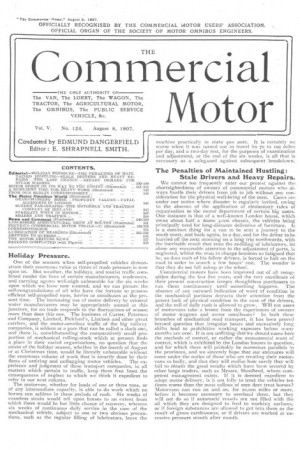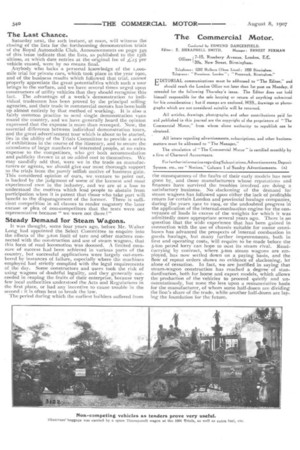Holiday Pressure.
Page 1

Page 2

If you've noticed an error in this article please click here to report it so we can fix it.
One, of the seasons when self-propelled vehicles demonstrate their enormous value at times of trade pressure is now upon us. Hot weather, the holidays, and tourist traffic combined render the lives of certain manufacturers, tradesmen, and carrying agents well-nigh unbearable for the six weeks upon which we have now entered, and we can picture the self-congratulations of all who have the fortune to possess efficient self-propelled vans, lorries or omnibuses at the present time. The increasing use of motor delivery by mineral water manufacturers may be appropriately named at this juncture, for no trade responds to the fluctuations of season more than does this one. The business of Carter, Paterson and Company, Limited, Pickford's, Limited, and other great carriers, and the motor-omnibus traffic of the big railway companies, is seldom at a pace that can be called a slack one, and there is, notwithstanding the comparatively small proportion of mechanical rolling-stock which at present finds a place in their varied organisations, no question that the strain of the holiday season, whether in the month of August or at Christmas time, would be literally unbearable without the enormous volume of work that is smartly done by their fleets of untiring and unflagging motor vehicles. The experience and judgment of these transport companies, in all matters which pertain to traffic, keep them free from the consequences of neglect to which we think it expedient to refer in our next column.
The motorvan, whether for loads of one or three tons, or of any intermediate capacity, is able to do work which no horses can achieve in these periods of rush. Six weeks of ceaseless strain would tell upon horses to an extent from which there would be but little chance of recovery, whereas six weeks of continuous daily service in the case of the mechanical vehicle, subject to one or two obvious precautions, such as the regular filling of lubricators, leave the
machine practically in statu quo ante. It is certainly no worse when it was turned out to travel its 70 to moo miles per day, and a two-day rest, for the purposes of examination and adjustment, at the end of the six weeks, is all that is necessary as a safeguard against subsequent breakdown.
The Penalties of Maintained Hustling: Stale Drivers and Heavy Repairs.
We cannot too frequently enter our protest against the shortsightedness of owners of commercial motors who always hustle their drivers froth job to job without any consideration for the physical well-being of the men. Cases are under our notice where disaster is regularly invited, owing to the absence of the application of elementary rules of organisation to the motor department of certain big users. One instance is that of a well-known London house, which owns about half a dozen 3-ton chassis, the vehicles being principally used for long-distance deliveries of furniture. It is a common thing for a van to be sent a journey to the south coast, and back again, in a day, and for the driver to be hurried off the next morning on a long trip northwards, with the inevitable result that even the re-filling of lubricators, let alone any reasonable attention to the adjustment of parts, is neglected, whilst the man in charge becomes so fatigued that he, as does each of his fellow drivers, is forced to halt on the road in order to snatch a few hours' rest. The wonder is that they do not fall asleep at the wheel.
Commercial motors have been improved out of all recognition during the last five years, and the very excellence of their present construction tempts thoughtless purchasers to run them continuously until something happens. The absence of any outward indication of want of condition in the mechanical portions detracts their attention from the patent lack of physical condition in the case of the drivers, and the evil of daily rush is allowed to grow. Will not users of motorvans take a lesson from the experiences of owners of motor wagons and motor omnibuses? In both these branches of mechanical road transport, it has been proved beyond question that irregular hours and excessively long shifts lead to prohibitive working expenses before many months are over. It is not unfitting that we should name here the methods of control, or rather the monumental want of control, which is exhibited by the London houses in question, and for which there will probably be numerous parallels in the provinces, and we sincerely hope that our strictures will come under the notice of those who are treating their motorvans so badly, and that they will realise how surely they will fail to obtain the good results which have been secured by other large traders, such as Messrs. Shoolbred, where competent management exists. If it is deemed expedient to adopt motor delivery, is it not folly to treat the vehicles ten times worse than the most callous of men dare treat horses? Motorvans can run on and on, for 20,000 miles or more, before it becomes necessary to overhaul them, but they will not do so if automatic vessels are not filled with the oil which they are designed to feed to working surfaces, or if foreign substances are allowed to get into them as the result of gross carelessness, or if drivers are worked at excessive pressure month after month.
The Last Chance.
Saturday next, the loth instant, at noon, will witness the closing of the lists for the forthcoming demonstration trials of the Royal Automobile Club. Announcements on page 549 of this issue indicate that the lists, as published to the t3th ultimo, at which date entries at the original fee of j:,25 per vehicle ceased, were by no means final.
Anybody who lacks a personal knowledge of the t,000mile trial for private cars, which took place in the year two, and of the business results which followed that trial, cannot properly appreciate the great potentialities which such a tour brings to the surface, and we have several times urged upon constructors of utility vehicles that they should recognise this fact. 'The advantage of a week's demonstration to individual tradesmen has been proved by the principal selling agencies, and their trade in commercial motors has been built up almost entirely by that method of working. It is also a fairly common practice to send single demonstration vans round the country, and we have generally heard the opinion expressed that the expense is more than recouped. Now, the essential difference between individual demonstration tours, and the great advertisement tour which is about to be started, lies in the ability of the Trials Committee to provide a series of exhibitions in the course of the itinerary, and to secure the attendance of large numbers of interested people, at no extra expense to the competitors, who get both accommodation and publicity thrown in at no added cost to themselves. We may candidly add that, were we in the trade as manufacturers or agents, we should give our most thorough support to the trials from the purely selfish motive of business gain. This considered opinion of ours, we venture to point out, is backed by the judgment of some of the keenest and most experienced men in the industry, and we are at a loss to understand the motives which lead people to abstain from participation when it is patent that those who take part will benefit to the disparagement of the former. There is sufficient competition in all classes to render nugatory the later excuse or plea of non-competitors that the tests were not representative because" we were not there!"
Steady Demand for Steam Wagons.
It was thought, some four years ago, before Mr. Walter Long had appointed the Select Committee to enquire into the effects of the 3-ton limit of tare and other matters connected with the construction and use of steam wagons, that this form of road locomotion was doomed. A limited measure of success had been achieved in various parts of the country, but successful applications were largely out-numbered by instances of failure, especially where the machines employed had strictly complied with the legal requirements of the day. Some constructors and nsers took the risk of using wagons of doubtful legality, and they generally succeeded in reaping the fruits of their enterprise, because very few local authorities understood the Acts and Regulations in the first place, or had any incentive to cause trouble in the second : it is often best to break the law.
The period during which the earliest builders suffered from
the consequences of the faults of their early models has now gone by, and those manufacturers whose reputations and finances have survived the troubles involved are doing a satisfactory business. No slackening of the demand for steam wagons has followed upon either the lack of profitable return for certain London and provincial haulage companies, during the years 1902 to 1o04, or the undoubted progress in the application of the internal-combustion engine for the conveyance of loads in excess of the weights for which it was admittedly more appropriate several years ago. There is no question that the wide experience that has been gained in connection with the use of chassis suitable for motor omnibuses has advanced the prospects of internal combustion in goods haulage, but many further improvements, both in first and operating costs, will require to be made before the 5-ton petrol lorry can hope to oust its steam rival. Roadcarrying by contract, where 5-ton steam wagons are employed, has now settled down on a paying basis, and the flow of repeat orders shows no evidence of slackening, let alone of cessation. In fact, we are justified in saying that steam-wagon construction has reached a degree of standardisation, both for home and export models, which allows the production of the vehicles to proceed quietly and unostentatiously, but none the less upon a remunerative basis for the manufacturer, of whom some half-dozen are dividing the lion's share of the trade, while another half-dozen are laying the foundation for the future.




















